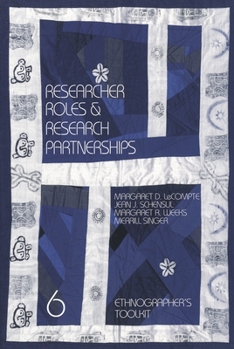Researcher Roles and Research Partnerships (Ethnographer's Toolkit)
Book six of the Ethnographer's Toolkit series discusses the special requirements that doing ethnographic research imposes on its practitioners. The authors first describe how the work of researchers is inextricably tied to their personal qualities, the social and cultural context of the research site, and the tasks and responsibilities that ethnographers assume in the field. The book then examines how qualitative researchers assemble research teams, establish partnerships with individuals and institutions in the field, and work collaboratively with a wide range of people and organizations to solve mutually identified problems. The book has a strong focus on the ethical components of doing research, and on the importance of collaboration and action-based research strategies. The authors also offer multiple strategies for working with institutional review boards (IRBs).
Format:Paperback
Language:English
ISBN:0761989730
ISBN13:9780761989738
Release Date:August 1999
Publisher:AltaMira Press
Length:192 Pages
Weight:0.70 lbs.
Dimensions:9.2" x 1.1" x 6.1"
Related Subjects
Cultural Politics & Social Sciences Social Science Social Sciences Specific DemographicsCustomer Reviews
1 rating
Very helpful guidelines
Published by Thriftbooks.com User , 23 years ago
This is the sixth volume of a seven-volume series titled "Ethnographer's Toolkit." It explains ethnographic research, the role of the researcher, the ethical considerations, and how to develop research partnerships. The authors use numerous case studies drawn both from their own experience and the experiences of colleagues to illustrate the points made. Key propositions are written in boldface and have a symbol in the margin. Definitions and cross-references to the other six books in the Toolkit series are also listed in the margin for easy reference. The book is designed for community organizers and service professionals, educators, professors and students in the social sciences and health services, for specialists in communications, and for students working in applied field settings (viii). But it is also helpful for development workers and missionaries, or any group that needs to survey community values, structures and needs. This is not a theoretical textbook, but a practical guidebook about a researcher's life in the field. It is divided into two chapters. The first chapter covers the different "roles that researchers adopt or acquire in the course of research activities; strategies for entry and survival in the field site; how the personal, professional, and philosophical characteristics of the researcher affect his or her access to information; and the ethical considerations for which ethnographers are accountable in the field. The second chapter covers the roles, strategies, and responsibilities of researchers who are working in, or organizing, research partnerships" (x). The authors explain each step in the process of ethnographic research, and the kinds of problems that might occur at that step, using many case studies of how that problem occurred and was handled. The checklists of behavioral dos and don'ts are universally applicable. I recommend this book, and the whole series, to anyone doing field research. Reviewed by Michael J. SquiresSIL International






